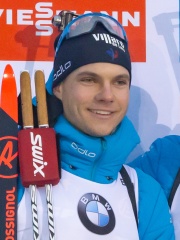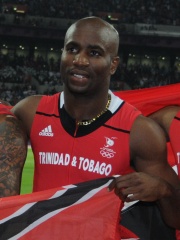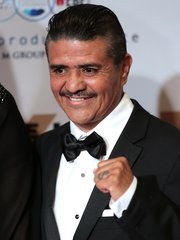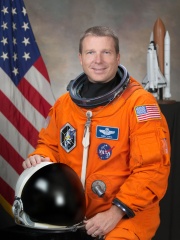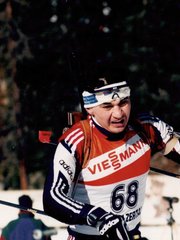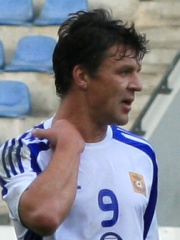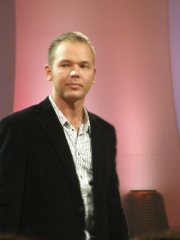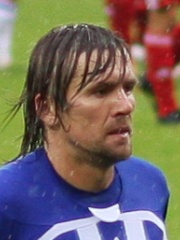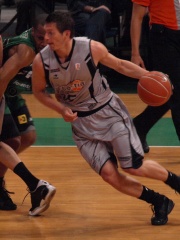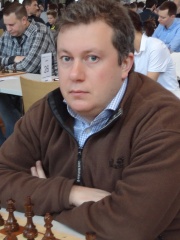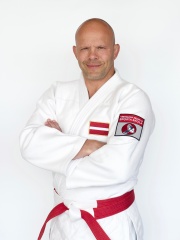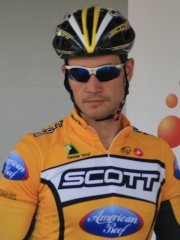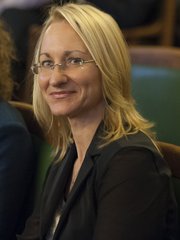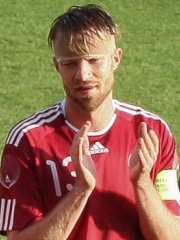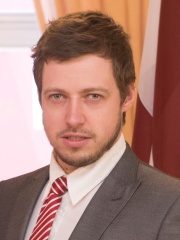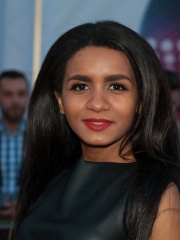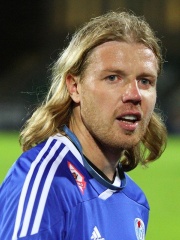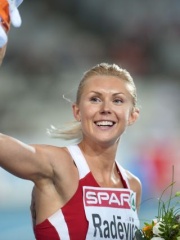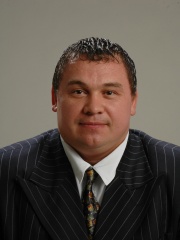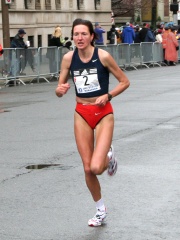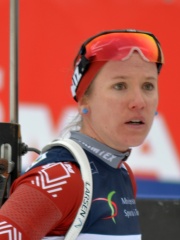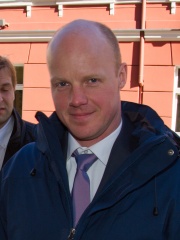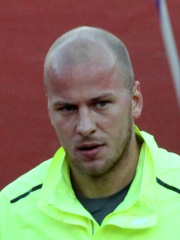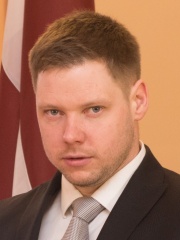Athlete
Marina Trandenkova
1967 - today

 Marina Trandenkova
Marina Trandenkova
Marina Evgenevna Trandenkova (Russian: Марина Евгеньевна Транденкова; born 7 January 1967) is a Russian athlete who competed mainly in the 100 metres. She competed for the Unified Team at the 1992 Summer Olympics held in Barcelona, Spain in the 4 × 100 metres where she won the silver medal with her teammates Olga Bogoslovskaya, Galina Malchugina and Irina Privalova. She was reprimanded in 1996 after testing positive for Bromantane. She is married to the former pole vaulter Igor Trandenkov. Read more on Wikipedia
Her biography is available in 16 different languages on Wikipedia (up from 15 in 2024). Marina Trandenkova is the 4,000th most popular athlete (down from 3,922nd in 2024), the 260th most popular biography from Latvia (up from 266th in 2019) and the 22nd most popular Latvian Athlete.
Memorability Metrics
Page views of Marina Trandenkova by language
Among Athletes
Among athletes, Marina Trandenkova ranks 4,000 out of 6,025. Before her are Kristina Poplavskaja, Genevieve Gregson, Émilien Jacquelin, Lynn Kanuka-Williams, Zoltán Kósz, and Igor Pavlov. After her are Ted Nash, Ulf Johansson, Andy Holmes, Steve Lewis, Emmanuel Callender, and Shirley Strong.
Most Popular Athletes in Wikipedia
Go to all RankingsKristina Poplavskaja
1972 - Present
HPI: 43.32
Rank: 3,994
Genevieve Gregson
1989 - Present
HPI: 43.31
Rank: 3,995
Émilien Jacquelin
1995 - Present
HPI: 43.31
Rank: 3,996
Lynn Kanuka-Williams
1960 - Present
HPI: 43.31
Rank: 3,997
Zoltán Kósz
1967 - Present
HPI: 43.30
Rank: 3,998
Igor Pavlov
1979 - Present
HPI: 43.30
Rank: 3,999
Marina Trandenkova
1967 - Present
HPI: 43.30
Rank: 4,000
Ted Nash
1932 - 2021
HPI: 43.29
Rank: 4,001
Ulf Johansson
1967 - Present
HPI: 43.28
Rank: 4,002
Andy Holmes
1959 - 2010
HPI: 43.28
Rank: 4,003
Steve Lewis
1969 - Present
HPI: 43.28
Rank: 4,004
Emmanuel Callender
1984 - Present
HPI: 43.28
Rank: 4,005
Shirley Strong
1958 - Present
HPI: 43.28
Rank: 4,006
Contemporaries
Among people born in 1967, Marina Trandenkova ranks 946. Before her are Stephan Freigang, Christophe Cocard, Patrick Galbraith, Andrei Ivanov, Michael Carbajal, and Zoltán Kósz. After her are Hermawan Susanto, Ulf Johansson, Terry W. Virts, Joe Greene, Michel Andrieux, and Pavel Muslimov.
Others Born in 1967
Go to all RankingsStephan Freigang
ATHLETE
1967 - Present
HPI: 43.45
Rank: 940
Christophe Cocard
SOCCER PLAYER
1967 - Present
HPI: 43.43
Rank: 941
Patrick Galbraith
TENNIS PLAYER
1967 - Present
HPI: 43.43
Rank: 942
Andrei Ivanov
SOCCER PLAYER
1967 - 2009
HPI: 43.40
Rank: 943
Michael Carbajal
BOXER
1967 - Present
HPI: 43.31
Rank: 944
Zoltán Kósz
ATHLETE
1967 - Present
HPI: 43.30
Rank: 945
Marina Trandenkova
ATHLETE
1967 - Present
HPI: 43.30
Rank: 946
Hermawan Susanto
BADMINTON PLAYER
1967 - Present
HPI: 43.29
Rank: 947
Ulf Johansson
ATHLETE
1967 - Present
HPI: 43.28
Rank: 948
Terry W. Virts
ASTRONAUT
1967 - Present
HPI: 43.24
Rank: 949
Joe Greene
ATHLETE
1967 - Present
HPI: 43.23
Rank: 950
Michel Andrieux
ATHLETE
1967 - Present
HPI: 43.21
Rank: 951
Pavel Muslimov
ATHLETE
1967 - Present
HPI: 43.20
Rank: 952
In Latvia
Among people born in Latvia, Marina Trandenkova ranks 260 out of 323. Before her are Vīts Rimkus (1973), Lauris Reiniks (1979), Dzintars Zirnis (1977), Jānis Blūms (1982), Arkadij Naiditsch (1985), and Vsevolods Zeļonijs (1973). After her are Raivis Belohvoščiks (1976), Dace Melbārde (1971), Kaspars Gorkšs (1981), Andris Šics (1985), Aminata Savadogo (1993), and Juris Laizāns (1979).
Others born in Latvia
Go to all RankingsVīts Rimkus
SOCCER PLAYER
1973 - Present
HPI: 43.52
Rank: 254
Lauris Reiniks
SINGER
1979 - Present
HPI: 43.44
Rank: 255
Dzintars Zirnis
SOCCER PLAYER
1977 - Present
HPI: 43.43
Rank: 256
Jānis Blūms
BASKETBALL PLAYER
1982 - Present
HPI: 43.43
Rank: 257
Arkadij Naiditsch
CHESS PLAYER
1985 - Present
HPI: 43.36
Rank: 258
Vsevolods Zeļonijs
ATHLETE
1973 - Present
HPI: 43.35
Rank: 259
Marina Trandenkova
ATHLETE
1967 - Present
HPI: 43.30
Rank: 260
Raivis Belohvoščiks
CYCLIST
1976 - Present
HPI: 43.26
Rank: 261
Dace Melbārde
POLITICIAN
1971 - Present
HPI: 43.18
Rank: 262
Kaspars Gorkšs
SOCCER PLAYER
1981 - Present
HPI: 42.98
Rank: 263
Andris Šics
ATHLETE
1985 - Present
HPI: 42.93
Rank: 264
Aminata Savadogo
SINGER
1993 - Present
HPI: 42.87
Rank: 265
Juris Laizāns
SOCCER PLAYER
1979 - Present
HPI: 42.87
Rank: 266
Among Athletes In Latvia
Among athletes born in Latvia, Marina Trandenkova ranks 22. Before her are Alexander Yegorov (null), Ineta Radēviča (1981), Viktors Ščerbatihs (1974), Jeļena Prokopčuka (1976), Baiba Bendika (1991), and Vsevolods Zeļonijs (1973). After her are Andris Šics (1985), Mārtiņš Rubenis (1978), Ainārs Kovals (1981), Vadims Vasiļevskis (1982), Juris Šics (1983), and Oskars Melbārdis (1988).
Alexander Yegorov
HPI: 45.56
Rank: 16
Ineta Radēviča
1981 - Present
HPI: 45.26
Rank: 17
Viktors Ščerbatihs
1974 - Present
HPI: 44.54
Rank: 18
Jeļena Prokopčuka
1976 - Present
HPI: 44.26
Rank: 19
Baiba Bendika
1991 - Present
HPI: 43.65
Rank: 20
Vsevolods Zeļonijs
1973 - Present
HPI: 43.35
Rank: 21
Marina Trandenkova
1967 - Present
HPI: 43.30
Rank: 22
Andris Šics
1985 - Present
HPI: 42.93
Rank: 23
Mārtiņš Rubenis
1978 - Present
HPI: 42.53
Rank: 24
Ainārs Kovals
1981 - Present
HPI: 42.47
Rank: 25
Vadims Vasiļevskis
1982 - Present
HPI: 42.15
Rank: 26
Juris Šics
1983 - Present
HPI: 42.12
Rank: 27
Oskars Melbārdis
1988 - Present
HPI: 40.43
Rank: 28


